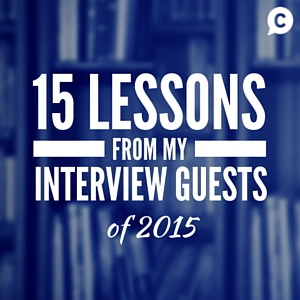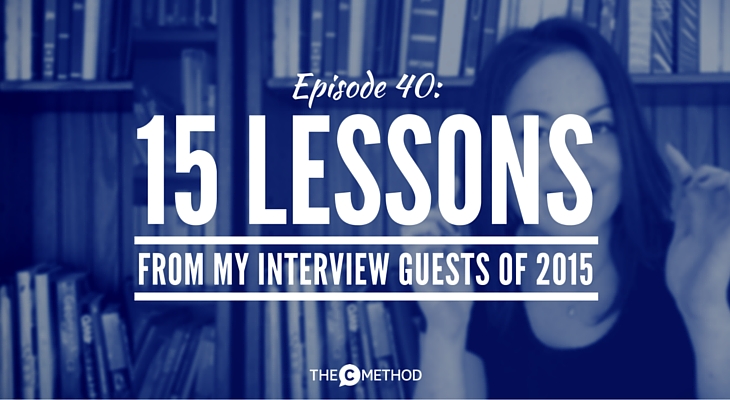 It’s the final episode for 2015!
It’s the final episode for 2015!
Thank you for being a loyal listener. You are a HUGE rock star!
This time of the year calls for a bit of self reflection, and as I look back on the last 39 episodes, I feel extremely grateful to have met and had conversations with many incredible people.
It’s meant there has been a lot of content shared on this podcast, so for this episode, I’ve picked 15 valuable lessons I learned from my interview guests to share with you.
They are in no particular order, and of course, I haven’t mentioned every single person I’ve interviewed.
If you’re new to the show, this episode will give you a taste of what it’s all about. And if you’re a frequent listener, you may discover something you missed during the first listen!
Here we go…
15 Lessons From My Interview Guests Of 2015
1. You don’t need permission from others to do stuff
This one’s from AppSumo’s Ayman Abdullah, in Episode 3. If you want to become something, or stand out and get noticed, just do that thing, and eventually people will take notice. He gives an example of actor Jimmy Tatro who, before he got his big break in 22 Jump Street, was making his own YouTube show for years.
So if you want to be an artist, musician, singer, writer, producer or whatever, you don’t need permission to do it. And don’t wait for someone to offer you a job doing it. Just go make whatever it is, and put it out there.
Click here to listen to ‘How to get any job and the attention of busy people with Ayman Abdullah’.
2. “We feel like there’s a glass wall between us and the other person. [But] the glass wall is built by us.”
When I spoke to Mixergy’s Andrew Warner in Episode 4, he told me he used to be really nervous talking to women, but he made it a habit to go out every day and do it. Eventually, he built up more confidence.
Click here to listen to ‘How to be confident and talk to anyone with Andrew Warner’.
3. The FORD principle (AKA The Greatest Communication Tool EVER)
This one’s courtesy of professional speaker Chris Helder. F-O-R stands for: Family/Friends, Occupation, and Relax. These are the things people WANT to talk about; the things that are most important to them. Ask people about these things, and conversation is easy. If it’s a social context, start with family and/or friends, then ask about their occupation. Then say “You sound so busy! How do you relax?”
The ‘D’ is for DREAMS. When someone shares their dreams with you (ie they go DEEP), you know you have rapport. This is when they show vulnerability. Listen to the episode to learn more about how to utilise this powerful tool in sales.
Click here to listen to ‘The Ultimate Tools for Influencing Others with Chris Helder’.
4. How to build your confidence
This is from my conversation with life coach and podcast host Christopher Browning. Here’s what you do: find 3 people who know you well, and ask them what they think you do better than most people, and what helps them the most. You’ll get an answer. Then ask them, “Why is that important to you?”
This is the VALUE you’re bringing people. Some people might tell you you’re good at the same thing, but the VALUE might be different. This exercise breaks down the feelings of “I have to be perfect”, and helps you to build confidence in your value to other people. You begin to realise you are ENOUGH, just as you are, right now.
Click here to listen to ‘How to Overcome Perfectionism with Christopher Browning’.
5. Morning events are easier for networking
Big thanks to Prescott Perez-Fox for this one. In Episode 12, we chatted about how to NOT be awkward in social situations. If you want to meet cool people, go to morning events. This is where the keen people go. And morning events are less formal than an evening one. People are more likely to be there alone, so they’re easier to talk to. Boom! This was one of the most-downloaded episodes of the year, so it’s well worth a listen.
Click here to listen to ‘How to not be awkward in social situations with Prescott Perez-Fox’.
6. Use Sidekick for Gmail
I learned about Sidekick in Episode 2 with Ringaround founder Eric Tozcko. Using the gmail plugin, you can see when people open and click the links in your emails. I’ve been using it, and it’s great for outreach. Get an invitation here.
Click here to listen to ‘How Erik Tozcko Building Companies Using Email Outreach’.
7. Have a different business card for each market segment
When photographer Arek Rainczuk showed me his business cards for his different segments – people with pets, couples and families – I was blown away. Tailoring a card to each segment positions you as a specialist for that segment – even though you work with others. Too clever!
Click here to listen to ‘How to Create Unforgettable Client Experiences with Arek Rainczuk’.
8. Starting a new business? You don’t need a bookkeeper
When I asked Boost Juice founder and Shark Tank investor Janine Allis what is the worst advice she hears being given to others, she replied: “Get a bookkeeper”. She told me that when you’re starting a business, you MUST know your numbers and how they work. Numbers don’t lie – they will tell you why your business is succeeding or not. Once you understand your numbers, then you can hire someone to do it for you.
Click here to listen to ‘Q&A with Boost Juice founder Janine Allis’.
9. It’s OK to be yourself when giving a presentation
Belinda Huckle is the founder of executive communication skills training company secondnature. When I spoke to her in Episode 22, she told me as a young professional, she was terrified at presenting to clients. However, she realised it was because she was trying to be exactly like her boss. Once she realised it was ok to be herself, her nerves melted away.
Click here to listen to ‘The Pivotal Success Factor for People in Business with Belinda Huckle’.
10. Think about the ‘baggage’ people are bringing into the room
Public speaking and presentation coach Sally Koering Zimney and I had a lovely chat in Episode 17. One thing she shared was: Think about the baggage people are bringing into the room with them. People make presentations all about THEM, she says, but really, your audience is thinking about themselves. Maybe they’re running late, they’re thinking about their next meeting, that report that’s due, or lunch.
So think about: how can you make the experience EASY for them? How can you cut through this noise; this baggage, so that your message gets across?
Click here to listen to ‘How to Give a Speech that Moves with Sally Koering Zimney’.
11. A new way to write ‘to do’ lists
A productivity tip from Ethan Glessich in Episode 27. Instead of writing a different, random to do list every day, write down 3 ‘weekly outcomes’ at the start of the week. Then, each day, write down your ‘to do’ tasks based on those weekly outcomes. I’ve been using it, and it works! Helps to keep me focused.
Click here to listen to ‘How to get your time back with enarah founder Ethan Glessich’.
12. An easy way to build rapport
John ‘The Rev’ McMahon shared this in Episode 36: If you want to connect with someone, find something you have in common with them, or some sort of connection, maybe they’re wearing something or have a similar haircut, and compliment them on that thing. For example, I always find it easy to connect with other women who have a cool short haircut. Too easy! (Hint: use it at networking events!)
Click here to listen to ‘Authentic, unfiltered and raw with John ‘The Rev’ McMahon’.
13. The 3 levels of learning
Calvin Coyles, founder of personal development company Young and Wildly Successful taught me this one in Episode 31. The 3 levels of learning are:
- The dabbler: Jumps from one thing to the next. Has a fast learning curve at the start, but as soon as they hit a plateau, they quit and move on to the next thing. And it happens in all areas of their lives – relationships, sports, activities, jobs etc.
- The high achiever: Starts something, and does whatever it takes to make it work. Hits a plateau, gets frustrated and tries harder and harder to break through. Eventually they do break through, only to hit another plateau. Plus, they’ve stressed themselves out and worked themselves to the bone in the process, and there’s no energy left to enjoy the rewards. Cue: burnout.
- The master: Understands there will be highs, lows and plateaus – and prepares for them. Finds a mentor who has gone through it all before, asks them how they did it, and models their success. Once they’ve learned everything they can from that mentor, they find another one who is even more successful.
Click here to listen to ‘How to master anything with Calvin Coyles’.
14. Most people don’t put in the extra effort to stand out
When I met Jimmy Dalgleish, I was blown away. Here was a guy who, like me, makes creative videos to stand out and get noticed! Jimmy’s specialty is entering competitions and winning them. When I spoke with him, I discovered that very few people enter video competitions, making them very easy to win. This also applies to other things, like job hunting or reaching out to clients. Put in the extra effort, and the results will be phenomenal.
Click here to listen to ‘Creative ways to win online competitions with Jimmy Dalgleish’.
15. Widen your spotlight when making an important decision
This was a bit of a different topic for the podcast, but an interesting one nonetheless. Basil Nuredini is a lawyer, decision making expert and author of the book “Less Risk More Reward”. He says to ‘widen your spotlight’ when it comes to making a big decision. Whatever big choice you’re making, chances are you’ve missed out on some. So take a step back and widen your spotlight to make a more informed decision.
Click here to listen to ‘How to Make Good Decisions with Basil Nuredini’.
And now…I’d like to hear from you!
What’s a topic you’d like to see covered on the show? Do you have a burning question, or something you’d like to be better at when it comes to communicating, confidence or standing out?
Just leave a comment below, or email me at cc[at]thecmethod.com.
Thanks for being an awesome listener! You rock 🙂

Leave a Reply